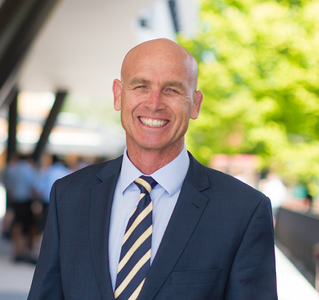Seeing Others as Gifts
Over the past two years, and before the challenges of the pandemic, France was unnerved by protesters wearing yellow vests. By law, all drivers in France, are required to have high visibility yellow vests with them in their cars to ensure they remain visible should they break down. The yellow vest protesters spread all around the world and became symbolic of the feeling of millions that they have become invisible. The protesters represented those in society where nobody notices them, they don’t exist, they do not count and are not counted.
Last week our community celebrated Service Day. In Marist schools, the question of service is guided by the Gospel, in particular the story of Jesus’ interaction with his world. Such modelling inevitably leads to confronting the culture of the day. Our Service Day is also an opportunity for some reflection as to why we encourage all of our boys to experience the grace and the many learnings that come through their involvement in service. Service plays an important role in reaching out to those living on the peripheries of society. We want our boys to have a generous heart, a giving heart and a heart that makes a difference to lives in the greatest need. I would argue, however, more important than the doing of good deeds is the experience of service that welcomes the stranger. Jesus spent his life befriending those excluded, those not noticed. Our service programs, when they are the most challenging, provide opportunities to not just give a helping hand but to rub up against the stranger and to provide warmth of companionship. A boy’s experiences is charged with making friendships with those our world holds to be impossible. Taking meals to the house-bound, who are sick or old, spending time in another country in a volunteer capacity, tutoring a student with a learning disability or joining a ‘black lives’ protest. It is the smell of poverty, the frailty of age, the frustration of disability that stir emotions. Experiences such as these are the yeast of conversion.

Of course, we cannot befriend everyone, yet the gospels teach us to offer friendship to those whose path we cross. The Good Samaritan on the road to Jericho crossed path with a dying man who had been robbed. Their lives intersected and a relationship was created with a stranger. The Samaritan made himself a neighbour.
These quieter times has allowed me to catch up with some recommended films. The Lady in the Van is a quirky British comedy based on a true story of how author Alan Bennett responded, even reluctantly, after he found a woman in a van parked in his driveway. An unusual friendship was forged by this accidental encounter and she stayed there for 15 years! The film is highly recommended and speaks much about the philosophy of our work in service at Marist College Canberra and we unashamedly place this challenge before the boys. I think Mother Teresa sums up our hopes and dreams of our service when she said: ‘The problem with the world is that we draw the circle of our family too small.’
Matthew Hutchison
Headmaster


















